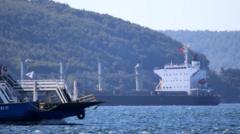As countries in southern Europe grapple with a severe heatwave pushing temperatures beyond 40°C, rampant wildfires are forcing thousands to evacuate their homes. The situation has grown increasingly dire, impacting multiple nations including Spain, Portugal, Italy, France, and Greece.
Southern Europe Endures Extreme Heat and Wildfires Amid Record Temperatures

Southern Europe Endures Extreme Heat and Wildfires Amid Record Temperatures
A relentless heatwave sparks widespread wildfires, evacuations, and heat-related fatalities across southern Europe.
In southern Europe, the ongoing heatwave pushes temperatures over 40°C leading to catastrophic wildfires.
With scorching temperatures reaching highs of 44°C (111.2°F) expected in Seville and Cordoba, southern Europe faces an unparalleled crisis as wildfires rage across Turkey, Spain, and other nations. Health authorities have issued red alerts, cautioning residents about the dangers of extreme heat. Tragically, a child succumbed to heatstroke in Sardinia, underscoring the serious effects of the unprecedented heatwave.
In Spain, where intense weather conditions have led to more than 30 active wildfires, nearly 4,000 people have been evacuated. The situation in Tres Cantos, near Madrid, reached alarming levels as officials described one fire exhibiting "explosive characteristics." Spain's Prime Minister Pedro Sanchez remarked on social media about the tireless efforts of emergency responders battling the blazes.
Across the border in Portugal, firefighters are engaged in a fierce struggle against multiple wildfires, with varying degrees of containment reported. Communities remain on high alert, facing the harsh climate that has led to widespread evacuations, including 2,000 tourists in the southern region near Tarifa.
The impact of soaring temperatures is felt not only in Spain and Portugal, but significantly across France, where at least 80 weather stations reported unprecedented temperature records. France's health system braced for the repercussions of this second heatwave in quick succession.
Meanwhile, in Greece, increasing winds exacerbated fire outbreaks on multiple tourist islands, forcing evacuations. Additionally, Turkey's Canakkale province has been plagued by severe wildfires, which prompted significant firefighting responses as the region remains perilous.
Moreover, Albania and Montenegro are also battling their respective wildfires, with reports of damage to properties and mass evacuations. The UK is experiencing similar weather extremes, with amber heat health alerts issued as temperatures approach 34°C.
Experts attribute these phenomena to global warming, arguing that it contributes to hotter and drier conditions in the Mediterranean, thereby lengthening and intensifying the wildfire season. As climate change continues to reshape environmental patterns, the future of wildfires and extreme heat in Europe remains a critical concern.
With scorching temperatures reaching highs of 44°C (111.2°F) expected in Seville and Cordoba, southern Europe faces an unparalleled crisis as wildfires rage across Turkey, Spain, and other nations. Health authorities have issued red alerts, cautioning residents about the dangers of extreme heat. Tragically, a child succumbed to heatstroke in Sardinia, underscoring the serious effects of the unprecedented heatwave.
In Spain, where intense weather conditions have led to more than 30 active wildfires, nearly 4,000 people have been evacuated. The situation in Tres Cantos, near Madrid, reached alarming levels as officials described one fire exhibiting "explosive characteristics." Spain's Prime Minister Pedro Sanchez remarked on social media about the tireless efforts of emergency responders battling the blazes.
Across the border in Portugal, firefighters are engaged in a fierce struggle against multiple wildfires, with varying degrees of containment reported. Communities remain on high alert, facing the harsh climate that has led to widespread evacuations, including 2,000 tourists in the southern region near Tarifa.
The impact of soaring temperatures is felt not only in Spain and Portugal, but significantly across France, where at least 80 weather stations reported unprecedented temperature records. France's health system braced for the repercussions of this second heatwave in quick succession.
Meanwhile, in Greece, increasing winds exacerbated fire outbreaks on multiple tourist islands, forcing evacuations. Additionally, Turkey's Canakkale province has been plagued by severe wildfires, which prompted significant firefighting responses as the region remains perilous.
Moreover, Albania and Montenegro are also battling their respective wildfires, with reports of damage to properties and mass evacuations. The UK is experiencing similar weather extremes, with amber heat health alerts issued as temperatures approach 34°C.
Experts attribute these phenomena to global warming, arguing that it contributes to hotter and drier conditions in the Mediterranean, thereby lengthening and intensifying the wildfire season. As climate change continues to reshape environmental patterns, the future of wildfires and extreme heat in Europe remains a critical concern.


















